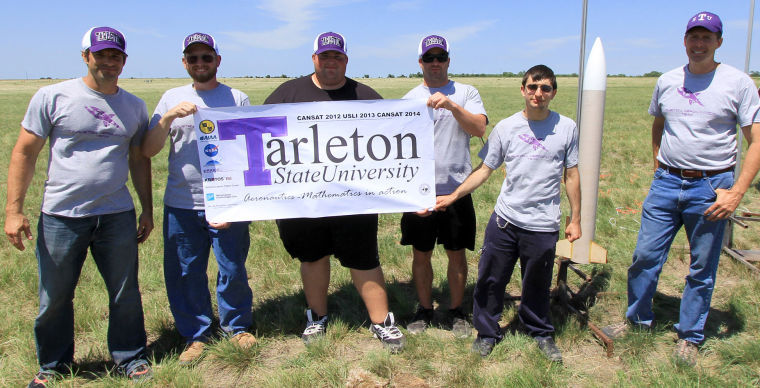Tarleton Rocket Team captures fifth in international competition
Members of the Tarleton Aeronautical Team (from left) Steve Merwin, Todd Byers, Dustin Neighbors, Cody Zipp, Randy Humphrey and faculty advisor Dr. Bo Brawner.
June 18, 2014
BURKETT, Texas—Competing against 58 teams from 13 nations, the Tarleton Aeronautical Team won fifth place in the annual international CanSat competition sponsored by the American Astronautical Society and the American Institute of Aeronautics and Astronautics.
Tarleton was the only Texas team in the student design competition, held in Burkett, near Abilene. When student teams arrive, they are provided a rocket in which to insert their can into the nose cone. The intent is to provide a hands-on learning engineering and electronics experience in designing the payload for the rocket, applying classroom information to real-life practice.
Although adverse weather conditions prevented the rocket from reaching the needed height of 500 meters for the satellite to separate from the rocket, the Tarleton team “analyzed the telemetry data and were able to show that their CanSat aborted separation by design,” said faculty adviser Dr. Bo Brawner, associate professor of mathematics. “As always, it came down to great documentation.”
The team consisted of five Tarleton students: Dustin Neighbors, Steve Merwin, Randy Humphrey, Todd Byers and Cody Zipp.
Final results were:
1 — Istanbul Technical University, the third oldest engineering school in the world and ranked first in Turkey and 108th in the world. They had five teams.
2 — SRM University of India, the top private engineering university in India, which had seven teams.
3 — University of Alabama-Huntsville, ranked 101st among public universities, with two teams.
4 — Ryerson University, Ontario, Canada.
5 — Tarleton State University, Stephenville, Texas.
Only the top five teams are placed, leaving such notable institutions as the University of Michigan, ranked 18th in the world, and Manchester University, England, ranked 40th in the world, as well as other prominent institutions from across the United States and around the world. The complete team list is at http://www.cansatcompetition.com/Teams.html.
Brawner expressed appreciation for the university’s “tremendous support of undergraduate research and applied learning experiences. It was a tremendous experience for our students.”



